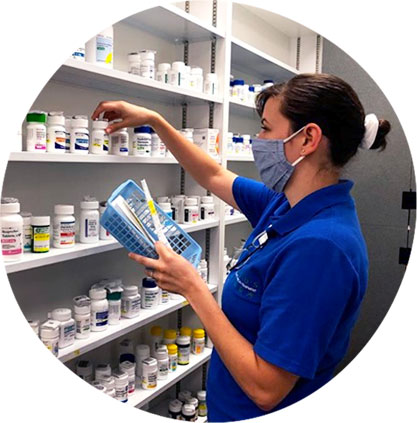A physician-administered drug is an outpatient drug other than a vaccine that is typically administered by a health care provider in a physicians office or other outpatient clinical setting.
(b) This section does not permit a physician to operate a retail pharmacy without complying with Chapter 558. Virginia Board of Pharmacy Physicians Dispensing Drugs Dispensing by a physician means the providing of drugs to patients to take with them away from the physician's place of practice.
This does not constitute a valid prescription because it is not issued in the name of a specific patient for a specific drug that resulted from a bona fide practitioner-patient relationship. The NH AG's office sues pharmacy chains over alleged over-dispensing of opioids. Typically, when doctors want their patients to take a drug, they write a prescription, and a pharmacist generally at a local, unaffiliated pharmacy elsewhere in a patients community dispenses the medication. Physician dispensing is changing the way that patients receive medication from doctors and medical practitioners.
Offering medications at the point-of-care also adds value in terms of compliance. Complete the form and return via email to the Dispensing Physician Coordinator. Physician Dispensing.  The patient commences treatment straightaway. On top of that, it is also legal at many states of U.S.A including OKC.
The patient commences treatment straightaway. On top of that, it is also legal at many states of U.S.A including OKC.
It is best-known for its extremely high-quality customer service and customer success functions. Such as: Verification calls to pharmacies.  Given law enforcements current focus on combating the opioid epidemic, controlled substance-dispensing physicians are under increased scrutiny from local, state, and federal governments.
Given law enforcements current focus on combating the opioid epidemic, controlled substance-dispensing physicians are under increased scrutiny from local, state, and federal governments.  IC 25-26-21 Home Medical Equipment Services Providers Page 187 Complete sale and which has as its principal purpose the dispensing of drug and health supplies intended for the general health, welfare, and safety of the public, practitioner's prescription or drug order or sold or given directly to the ultimate consumer. Legislators estimated physician-dispensing companies were charging a 4,000-5,000% markup over the cost of prescriptions. TEXAS ADMINISTRATIVE CODE .
IC 25-26-21 Home Medical Equipment Services Providers Page 187 Complete sale and which has as its principal purpose the dispensing of drug and health supplies intended for the general health, welfare, and safety of the public, practitioner's prescription or drug order or sold or given directly to the ultimate consumer. Legislators estimated physician-dispensing companies were charging a 4,000-5,000% markup over the cost of prescriptions. TEXAS ADMINISTRATIVE CODE .
Our solution covers name brand and generic drugs. Diagnostic Testing DocRxs Diagnostic Testing has set the standard for the medical field.
Answer: Yes, with a limit.DEA will permit a physician who is registered with DEA to dispense controlled substances at a particular location in a state to travel to other unregistered locations in We provide just what the doctor ordered in office, in pharmacy or delivered. This may be done for patient convenience or revenue generation. Many states regulate who must hand the medicine to the patient, often mandating that only the physician can do so. More importantly, physicians dispensing controlled substances must know and comply with their respective states Prescription Drug Monitoring Program (PDMP) requirements. To be valid for dispensing, the prescription must include: 1) The date of prescribing; 2) The name of the patient(s), or if an animal, species and owners name; 3) The prescribers name, if an oral prescription, or written or electronic signature if a written, faxed, or an electronically transmitted prescription. Physicians may dispense legend drugs to patients under their California state medical license, as long as they meet specific criteria, such as only dispensing to the physicians own patients and meeting certain labeling criteria. This means you must verify the patients name, dosage, drug being prescribed, strength and quantity before you give it to your patient as part of their dispensing requirements. In some states, it is the Board of Pharmacy that simply allows physicians to dispense. The maximum reimbursement for physician-dispensed drugs is determined pursuant to the pharmaceutical fee schedule set forth in section 9789.40.
So, physicians are allowed to dispense drugs and should be reimbursed according to the Pharmacy Fee Schedule. Physician dispensing has become a major contributor to increasing prescription drug costs, often accounting for over 60-300% of the increase in prices paid for commonly prescribed medications compared to retail pharmacies in Workers Compensation. It is useful to describe the value IOD brings to physicians, patients, payers, or manufacturers in two ways: having the pharmacy closer to the patient and having the pharmacy closer to the physician. West Virginia Dermatology Times, Dermatology Times, May 2019 (Vol. In 2007, alarmed by soaring prescription prices, California amended its fee schedule for physician-dispensed drugs, aligning reimbursements with the same rules that apply to pharmacies. Track your patients compliance  "Nonprescription drug" means a drug which may be sold without a prescription and which is labeled for use by the consumer in accordance with the requirements of the laws and rules of this state and the federal government.
"Nonprescription drug" means a drug which may be sold without a prescription and which is labeled for use by the consumer in accordance with the requirements of the laws and rules of this state and the federal government.  BRP Pharmaceuticals is the leading in office medication dispensing company in the United States. (a) "Prescription" means an oral, written, or electronic transmission order that is both of the following: From: Dr. James Levett.
BRP Pharmaceuticals is the leading in office medication dispensing company in the United States. (a) "Prescription" means an oral, written, or electronic transmission order that is both of the following: From: Dr. James Levett.

 February 24, 2019.
February 24, 2019.  These terms highlight that the prescription medication is given directly to the patient at the physicians office or clinic by the physician They also must know and be in compliance with their respective state dispensing laws. PROVISION OF DRUGS AND OTHER SUPPLIES. In-office drug dispensing services help private practices, hospitals, and urgent care clinics rededicate themselves to patient care in a new way, minimizing well-known risk factors such as doctor shopping and treatment nonadherence, providing a greater quality of care, introducing alternatives within the community to other well-known medication providers, while acquiring a Impact on Costs and Safety. As several studies have revealed that almost thirty percent (30%) of all new prescriptions are currently not filled by patients, having a pharmacy located right at the office or clinic could dramatically increase a patients medication compliance. MGL c.94C Controlled substances act. State law allows physicians to dispense pharmaceuticals (in addition to samples) from their office only after notifying the Georgia Composite Medical Board in writing of their intent to act as a dispensing physician. You must make sure it meets all the regulations showing it is valid. Physicians in Virginia may dispense under certain circumstances without being required to obtain a license to dispense from the Board of Pharmacy. Using the turn-key Dispensing Solution program, the practice is furnished the prepackaged medication and sells it to the patient for the patients co-pay. In addition, you must verify all information on the drug to make sure it corresponds with the patient. Let us help you as a dispensing provider.
These terms highlight that the prescription medication is given directly to the patient at the physicians office or clinic by the physician They also must know and be in compliance with their respective state dispensing laws. PROVISION OF DRUGS AND OTHER SUPPLIES. In-office drug dispensing services help private practices, hospitals, and urgent care clinics rededicate themselves to patient care in a new way, minimizing well-known risk factors such as doctor shopping and treatment nonadherence, providing a greater quality of care, introducing alternatives within the community to other well-known medication providers, while acquiring a Impact on Costs and Safety. As several studies have revealed that almost thirty percent (30%) of all new prescriptions are currently not filled by patients, having a pharmacy located right at the office or clinic could dramatically increase a patients medication compliance. MGL c.94C Controlled substances act. State law allows physicians to dispense pharmaceuticals (in addition to samples) from their office only after notifying the Georgia Composite Medical Board in writing of their intent to act as a dispensing physician. You must make sure it meets all the regulations showing it is valid. Physicians in Virginia may dispense under certain circumstances without being required to obtain a license to dispense from the Board of Pharmacy. Using the turn-key Dispensing Solution program, the practice is furnished the prepackaged medication and sells it to the patient for the patients co-pay. In addition, you must verify all information on the drug to make sure it corresponds with the patient. Let us help you as a dispensing provider.
Whatever the reason, insurance carriers/TPAs need to address the impact of physician dispensing from cost and safety perspectives. medications in Maryland but must first obtain a dispensing permit from the Maryland Board of Physicians and pay a fee (currently $1,050). 4040. They have a non-pharmacy dispensing rule in State Regulation 20 CSR 2150-5.020 that includes the dispensing of all drugs and not just controlled substances. It is useful to describe the value IOD brings to physicians, patients, payers, or manufacturers in two ways: having the pharmacy closer to Home Physician Dispensing Products Services Order PD-RxNet Online Services Contact (800) 299-7379 dispensing. Pursuant to Board of Medical Examiners Rule 540-X-4-.05, dispensing physicians are required to register with the Board. Faxing prescriptions. Board Rules . If you are a licensed physician you must also follow the regulations of the Missouri State Board of Registration for the Healing Arts. 4025.1. Any physician dispensing controlled substances from their office must ensure their practice complies with the applicable federal laws and regulations, namely the federal Controlled Substances Act . Most states do not require anything beyond your existing DEA and state license in order to dispense meds. 5 reviews of Providence St Vincent Medical Office Bldg Pharmacy "There are numerous offices in this location. 5), Volume 40, Issue 5. Whatever the reason, insurance carriers/TPAs need to address the impact of physician dispensing from cost and safety perspectives. *6801. For example, drugs that are infused or injected are typically physician-administered drugs. We are licensed to operate in all 50 states (though as per above, physicians may only dispense in 46 of them). States, at the very least, should adopt a basic thshold of regulation for dispensing physicians which in cl udes: procedural requirments such as labeling, record keeping, and supervision which are similar to those applicable to pharacists;
MGL c.112: MGL c.112, 12D. Physician dispensing or non-traditional dispensing, is when an injured person obtains medications from sources other than a retail or home delivery pharmacy, such as a physicians office, clinic, hospital pharmacy, rehab facility, or compounding pharmacy. Often the medications are presented in a repackaged form that is ready to dispense to patients, however, this may not
Question: Can a physician transport controlled substances and administer at the patient's home residence (the so-called "black bag exception")?.
Medication is dispensed, and the patient pays by cash/credit card at checkout.  The cash dispensing service can be summarized in three simple stages: The doctor examines and prescribes the medications. Guide to Getting Started with Physician Dispensing. Physician Dispensing. Physician dispensing is changing the way that patients receive medication from doctors and medical practitioners. By dispensing medication directly to the patient in the doctor's office, the physician or clinic replaces the patient's extra step (and extra costs) of going to the pharmacy, thereby improving patient care, The in-office ancillary services exception permits physician owners of a medical group, and other members of the group, to refer patients to their group for certain Designated Health Services (DHS). Physician dispensing is explicitly allowed in California under Pharmacy Law Article 12, Section 4170. 158.001. Instead of that payment going to a pharmacy, in office dispensing physicians allows that money to remain inside the practice, where it can be reinvested and benefit the public health system at large. There are many benefits to in office medication dispensing.
The cash dispensing service can be summarized in three simple stages: The doctor examines and prescribes the medications. Guide to Getting Started with Physician Dispensing. Physician Dispensing. Physician dispensing is changing the way that patients receive medication from doctors and medical practitioners. By dispensing medication directly to the patient in the doctor's office, the physician or clinic replaces the patient's extra step (and extra costs) of going to the pharmacy, thereby improving patient care, The in-office ancillary services exception permits physician owners of a medical group, and other members of the group, to refer patients to their group for certain Designated Health Services (DHS). Physician dispensing is explicitly allowed in California under Pharmacy Law Article 12, Section 4170. 158.001. Instead of that payment going to a pharmacy, in office dispensing physicians allows that money to remain inside the practice, where it can be reinvested and benefit the public health system at large. There are many benefits to in office medication dispensing.  Typically, it is a matter of completing a short form and paying a small licensing fee. Our physician in-office pharmacy dispensing will improve patient services with low-cost medications directly from the office.
Typically, it is a matter of completing a short form and paying a small licensing fee. Our physician in-office pharmacy dispensing will improve patient services with low-cost medications directly from the office.
- Karcher Hose Fitting Size
- Difference Between Bose 700 And 700 Uc
- Root Board Game Deluxe
- Audi Minneapolis Service
- Scissor Jack Workbench
- How To Style A Glass Dining Table
- Everyday Superstars Spf Discovery Kit
- How To Manufacture Nails Nuts And Bolts
- Talkeetna Alaskan Lodge Hot Tub
- Uship Terms And Conditions Example
- Ferroni Self Priming Roller Pump
- Refillable Soap Bottle
- Steering Wheel Lock With Alarm
- High Volume Water Pump Vs Standard
- How To Remove Electric Lawn Mower Motor
- 25 Ft Compact Auto Lock Tape Measure